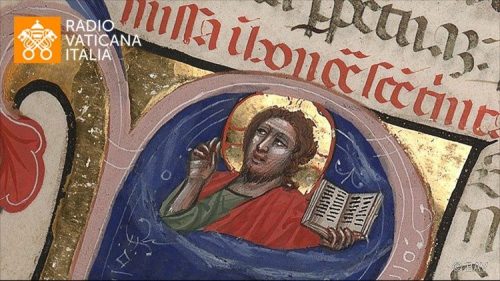READING OF THE DAY
JB 3:1-3, 11-17, 20-23
Job opened his mouth and cursed his day.
Job spoke out and said:Perish the day on which I was born,
the night when they said, “The child is a boy!”Why did I not perish at birth,
come forth from the womb and expire?
Or why was I not buried away like an untimely birth,
like babes that have never seen the light?
Wherefore did the knees receive me?
or why did I suck at the breasts?For then I should have lain down and been tranquil;
had I slept, I should then have been at rest
With kings and counselors of the earth
who built where now there are ruins
Or with princes who had gold
and filled their houses with silver.There the wicked cease from troubling,
there the weary are at rest.Why is light given to the toilers,
and life to the bitter in spirit?
They wait for death and it comes not;
they search for it rather than for hidden treasures,
Rejoice in it exultingly,
and are glad when they reach the grave:
Those whose path is hidden from them,
and whom God has hemmed in!
GOSPEL OF THE DAY
MT 18:1-5, 10
The disciples approached Jesus and said,
“Who is the greatest in the Kingdom of heaven?”
He called a child over, placed it in their midst, and said,
“Amen, I say to you, unless you turn and become like children,
you will not enter the Kingdom of heaven.
Whoever humbles himself like this child
is the greatest in the Kingdom of heaven.
And whoever receives one child such as this in my name receives me.“See that you do not despise one of these little ones,
for I say to you that their angels in heaven
always look upon the face of my heavenly Father.”
WORDS OF THE HOLY FATHER
God has no difficulty in making Himself understood by children, and children have no difficulty in understanding God. It is not by chance that in the Gospel there are several very beautiful and powerful words of Jesus regarding the “little ones”. This term, “babes”, refers to all the people who depend on the help of others, and to children in particular. For example, Jesus says: “I thank thee, Father, Lord of heaven and earth, that thou hast hidden these things from the wise and understanding, and revealed them to babes” (Mt 11:25). And again: “See that you do not despise one of these little ones: for I tell you that in heaven their angels always behold the face of my Father who is in heaven” (Mt 18:10).
Thus, children are in and of themselves a treasure for humanity and also for the Church, for they constantly evoke that necessary condition for entering the Kingdom of God: that of not considering ourselves self-sufficient, but in need of help, of love, of forgiveness. We all are in need of help, of love and of forgiveness! Children remind us of another beautiful thing: they remind us that we are always sons and daughters. Even if one becomes an adult, or an elderly person, even if one becomes a parent, if one occupies a position of responsibility, underneath all of this is still the identity of a child. We are all sons and daughters. And this always brings us back to the fact that we did not give ourselves life but that we received it. The great gift of life is the first gift that we received. Sometimes in life we risk forgetting about this, as if we were the masters of our existence, and instead we are fundamentally dependent. In reality, it is a motive of great joy to feel at every stage of life, in every situation, in every social condition, that we are and we remain sons and daughters. This is the main message that children give us, by their very presence: simply by their presence they remind us that each and every one of us is a son or daughter.
But there are so many gifts, so many riches that children bring to humanity. I shall mention only a few.
They bring their way of seeing reality, with a trusting and pure gaze. A child has spontaneous trust in his father and mother; he has spontaneous trust in God, in Jesus, in Our Lady. At the same time, his interior gaze is pure, not yet tainted by malice, by duplicity, by the “incrustations” of life which harden the heart. We know that children are also marked by original sin, that they are selfish, but they preserve purity, and interior simplicity. But children are not diplomats: they say what they feel, say what they see, directly. And so often they put their parents in difficulty, saying in front of other people: “I don’t like this because it is ugly”. But children say what they see, they are not two-faced, they have not yet learned that science of duplicity that we adults have unfortunately learned.
Furthermore, children — in their interior simplicity — bring with them the capacity to receive and give tenderness. Tenderness is having a heart “of flesh” and not “of stone”, as the Bible says (cf. Ezek 36:26). Tenderness is also poetry: it is “feeling” things and events, not treating them as mere objects, only to use them, because they are useful….
Children have the capacity to smile and to cry. Some, when I pick them up to embrace them, smile; others see me dressed in white and think I am a doctor and that I am going to vaccinate them, and they cry… spontaneously! Children are like this: they smile and cry, two things which are often “stifled” in grown-ups, we are no longer capable…. So often our smile becomes a cardboard smile, fixed, a smile that is not natural, even an artificial smile, like a clown. Children smile spontaneously and cry spontaneously. It always depends on the heart, and often our heart is blocked and loses this capacity to smile, to cry. So children can teach us how to smile and cry again. But we must ask ourselves: do I smile spontaneously, frankly, with love or is my smile artificial? Do I still cry or have I lost the capacity to cry? These are two very human questions that children teach us.
For all these reasons Jesus invited his disciples to “become like children”, because “the Kingdom of God belongs to those who are like them” (cf. Mt 18:3; Mk 10:14).
(General Audience, 18 March 2015)

